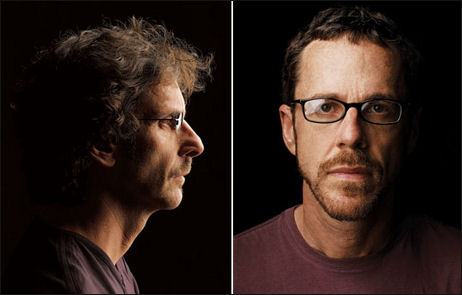The lamenting in Joel and Ethan Coen‘s No Country for Old Men — those perfect, world-weary ruminations spoken by Tommy Lee Jones‘ lawman character about dissipation and ghosts and the fate that you can’t see coming, much less stop — are what the film (slavishly faithful to Cormac McCarthy‘s novel) is all about. It’s the damn raison d’etre. Take it or leave it but the tune is the tune.

Joel and Ethan Coen
The Coens ladle it out in even portions all through. It’s stated plain as day in Jones’ opening narration, in those chats he has with those two old coots (played by Barry Corbin and Rodger Boyce), and in that last description of a dream he’s had about his long-gone father. You can whinny and rear up and say “hold up there, that’s not the resolution I’m looking for” but hell, that’s just spittin’ in the wind.
In his New York magazine essay on the Coens and Old Men, critic David Edelstein says what I’m sure 95% of the paying moviegoers will be muttering about as they exit the theatre. I’m no one to talk — I complain about films not doing what I want them to do all the time — but it’s a little dispiriting to read an exceptionally smart and perceptive guy siding with the brutes on this one.
“In the film,” he writes, “you wait to see the sheriff, the venerable rock of decency, confront the newfangled evil in a showdown as cathartic as Carl Franklin‘s B-movie classic One False Move. But the Coens are true to their source, if not their strengths. I’m told that McCarthy liked the last part of the picture best, and he would.”
The final No Country scene is what I like best also. What Jones says (and the way he looks as he says it, and that five or six-second delay before the cut to black) sums it all up and takes it home. The question should be “does No Country for Old Men stick to its guns and achieve its goals in a way that works according to its own motto and terms?” Damn straight it does. That’s why it’s a great film — the finest the Coens have ever made. The probability of some people saying “what the hell?” at the end is, for me, in a roundabout way, one reason why it sits tall in the saddle.









